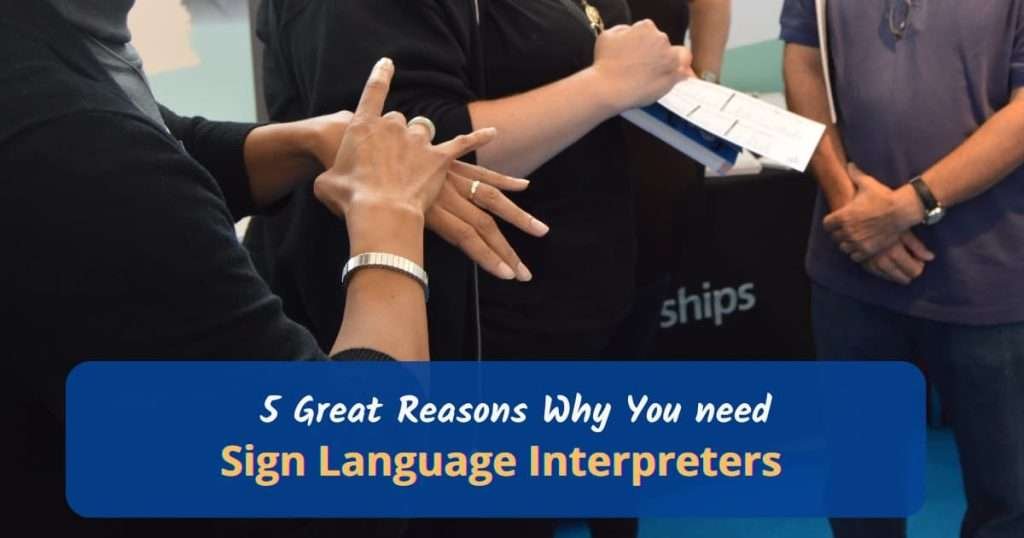Why do you need one if this is your first time using a BSL interpreter? You may have never met a deaf person or have assumptions about sign language. So, it’s hard to understand why you need an interpreter. We’re giving you 5 reasons why you need sign language interpreters We’ll also give tips on how to use one and answer other common questions.
What is a Sign Language Interpreter, and why are they needed?
The simplest explanation is that an interpreter puts speech into BSL and vice versa. Interpreters have diverse communication skills. They ensure that deaf and hearing people can communicate with each other.
Why do you need sign language interpreters?
1. You don’t know any sign language
British Sign Language is a recognised language of the UK. It’s hard to believe, but you may meet someone who uses a different language other than English. Believe it or not, there is more than one indigenous language in the UK. You could meet someone who uses Welsh, Cornish, Gaelic or BSL. The language you are least likely to know is BSL. Unlike Welsh, Gaelic or Cornish, it is not a regional language. It is a visual language used by profoundly deaf people and their families. If you don’t know any BSL or you’re not fluent, you’re going to need an interpreter.
2. You run a service open to the public
If you provide goods and services to the public, you should expect a deaf customer. One in six people are deaf. If a deaf person cannot use your service, you need to make ‘reasonable adjustments. A reasonable adjustment (depending on the situation) is providing an interpreter. This will let a deaf person use your service.
Health services, schools, and colleges also need to adjust their services. They cannot refuse to make adjustments.
3. You have a deaf employee
Deaf employees need to be able to talk with other work colleagues. Most workers are hearing. An interpreter can help with communication. They help both hearing and deaf workers understand each other.
At work, the deaf employee uses a sign language interpreter. This gives them equal access to discussions with hearing co-workers.
4. Deaf family members will be attending an event.
Events like weddings, funerals, and parties can be hard for BSL users. An interpreter can help bridge the gap between deaf and hearing family members. Interpreters also make large events, such as concerts, accessible.
5. You need consent
For any medical or legal document, you need to get consent. For example, if you are a doctor, you need consent before you can operate. A patient has to understand any risks or side effects of treatment before giving ‘informed consent’. This allows treatment to go ahead. In this case, you would book an interpreter to explain everything to the patient before going ahead with treatment.
Are sign language interpreters in demand?
There is a significant and growing demand for sign language interpreters. More sign language users are gaining access to daily life. So, the demand for interpreters is growing.
You can make the most of any situation where you use an interpreter by following some basic rules. There are some do’s and don’ts to communicating via an interpreter.
For example, you need to speak directly to the deaf person . Avoid phrases such as “can you tell him….”.
You can find the full list of ‘dos and don’ts‘ online.
How much does it cost to hire a BSL interpreter?
The cost of hiring an interpreter can vary. It depends on factors like location, event duration, the interpreter’s experience. and whether you decide to use an agency.
How much do interpreters charge?
Most BSL interpreters use the NUBSLI fee guide. They use it to decide what fee to charge for attending a booking. BSL interpreters do not tend to charge by the hour as they are not employees. They are like any other professional. They charge a minimum call-out fee for their services.
Who pays for a BSL interpreter?
The responsibility for paying fees depends on the situation.
For instance, the employer may be responsible for covering the cost in the workplace. At the same time, the family may have to bear the cost of weddings or funerals.
For public services, the service provider pays for the interpreter. The fees for access to medical services are usually covered by funding from NHS England.
How to find and book an interpreter?
You can find and book a registered BSL interpreter on the NRCPD website. You can search the register if you are looking for someone with a particular specialism.
All interpreters have terms and conditions for working with clients. Before they provide a service, you will be asked to agree on fees and terms and conditions.
All interpreters have trained for years. They have personal indemnity insurance and a DBS certificate. They must do 24 hours of CPD each year to keep up standards. This goes beyond what some languages need. So, be assured that you get quality services.
BSL interpreter agencies
Specialist agencies can provide BSL interpreters. Agencies contact a pool of skilled BSL interpreters. You can book them for events. These include business meetings, conferences, lectures, weddings, and more.
Clients who contact a BSL agency will discuss their needs. The agency will book an interpreter who best meets those needs.
BSL agencies can also support interpreters with training and professional development. Additionally, some BSL agencies may provide other services. These include deaf awareness training, sign language classes, and consulting. They help organisations improve their accessibility for deaf and hard-of-hearing people.
BSL interpreter code of conduct
The interpreter code of conduct can be found on the NRCPD website. Interpreters use a reflective practice model. It lets them adapt their work to the needed context. For example, interpreting in a police station needs a different approach to interpreting at a music concert.

